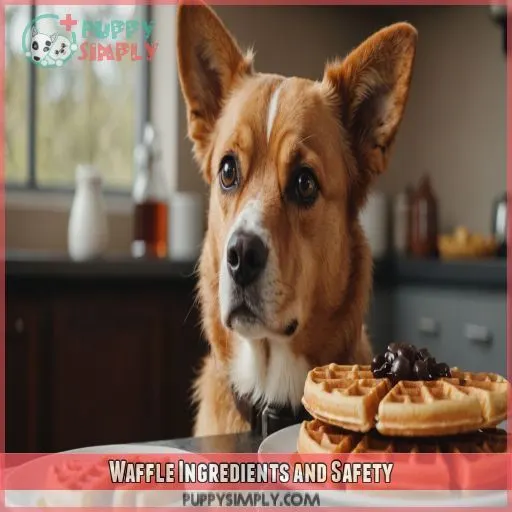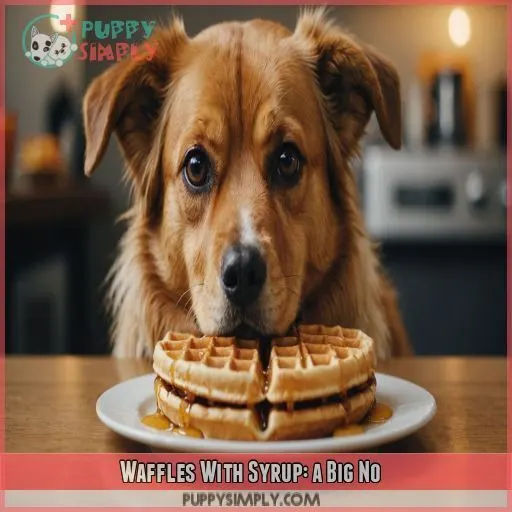This site is supported by our readers. We may earn a commission, at no cost to you, if you purchase through links.
 Can dogs eat waffles? It’s not exactly a walk in the park! While plain, homemade waffles aren’t toxic, they’re not exactly a doggy delicacy either.
Can dogs eat waffles? It’s not exactly a walk in the park! While plain, homemade waffles aren’t toxic, they’re not exactly a doggy delicacy either.
Think of waffles as the canine equivalent of that greasy fast food you occasionally indulge in – okay as a rare treat, but not something you’d want to make a habit of.
Frozen waffles are a big no-no, though, as they often contain additives and artificial sweeteners that can be harmful to your furry friend.
If you’re considering sharing your breakfast with Fido, remember: moderation is key, and skip the syrup!
Curious about safer alternatives? There’s a whole world of dog-friendly treats to explore.
Table Of Contents
- Key Takeaways
- Waffle Ingredients and Safety
- Health Benefits and Risks of Waffles
- When Waffles Are Safe for Dogs
- When Waffles Are Not Safe for Dogs
- Alternative Healthy Treats for Dogs
- Waffles With Syrup: a Big No
- Waffles Without Syrup: a Safer Option
- Waffles With Butter: a Fat-Rich Hazard
- Additional Waffle Considerations
- Homemade Waffle Recipe for Dogs
- Frequently Asked Questions (FAQs)
- Conclusion
Key Takeaways
- Plain waffles are like that friend who’s mostly harmless but not exactly a health guru – okay as an occasional treat, but don’t make it a habit. Your pup’s waistline will thank you!
- Toppings are where things get dicey. Syrup, chocolate, and xylitol are big no-nos that could turn breakfast into a vet visit. Stick to naked waffles if you must share.
- homemade waffles are the way to go if you’re determined to let Fido join the brunch party. Swap in some dog-friendly ingredients and leave out the sugar – it’s like doggy gourmet!
- When in doubt, stick to treats made for four-legged foodies. There’s a whole world of tail-wagging goodies out there that won’t send you on a guilt trip to the vet.
Waffle Ingredients and Safety
You might be wondering, "What’s in a waffle anyway?" Well, the typical waffle contains flour, eggs, milk, and baking powder. While these ingredients are generally safe for dogs, there are a few things to keep in mind before you offer your pup a bite.
Let’s take a closer look at the potential benefits and risks of these ingredients for our furry friends.
Flour, Eggs, Milk, and Baking Powder
Waffles contain flour, eggs, milk, and baking powder. Flour is generally safe for dogs, but some may have wheat or gluten allergies. Eggs provide protein, but too many can upset a dog’s stomach. Milk can cause lactose intolerance, leading to gas and diarrhea. A little baking powder is fine, but too much can be harmful.
Potential Allergies and Intolerances
Dogs, just like humans, can have their own dietary restrictions when it comes to allergies and intolerances. Here are some common issues to keep in mind:
- Wheat allergies and gluten sensitivity: Flour is a key ingredient in waffles, and while it’s generally safe, some dogs may react negatively to wheat or gluten. If your dog has a sensitive stomach, consider gluten-free options or stick to other treats.
- Lactose intolerance: Milk is common in waffles and can cause digestive issues for lactose-intolerant dogs. Opt for lactose-free alternatives or choose a different treat.
- Egg allergies: Eggs provide protein, but some dogs may be allergic. Consult your vet if you notice any adverse reactions.
Toxic Ingredients to Avoid
While the thought of sharing a delicious waffle with your furry friend may be tempting, it’s important to remember that some waffle ingredients can be toxic to dogs. Here’s a list of toxic ingredients to avoid:
| Toxic Ingredient | Why It’s Harmful |
|---|---|
| Xylitol | Found in some syrups and sugar substitutes, xylitol is extremely toxic to dogs and can cause a rapid drop in blood sugar and liver damage. |
| Chocolate | Chocolate contains theobromine, which dogs metabolize much more slowly than humans, leading to potential toxicity and adverse effects on the heart and nervous system. |
| Raisins | Though nutritious for humans, raisins (and grapes) can cause kidney failure in dogs and should be avoided at all costs. |
| Nuts | While not necessarily toxic, nuts can be difficult for dogs to digest and may contain high levels of salt or sugar, leading to stomach upset or more serious health issues. |
| Artificial Sweeteners | These sweeteners, often found in sugar-free syrups or toppings, can be harmful to dogs and cause a range of issues from digestive upset to more severe neurological symptoms. |
Health Benefits and Risks of Waffles
While waffles can provide some nutritional benefits to dogs, such as protein from eggs and calcium from milk, they’re not a significant source of nutrition. Excessive consumption can lead to weight gain and health issues.
Nutritional Value of Waffles
So, can dogs eat waffles? The short answer is yes, but there are some important things to keep in mind.
Let’s talk about the nutritional value of waffles and how they can impact your furry friend‘s health.
Waffles are typically high in carbohydrates, providing energy, but they’re low in protein and fat. They offer some fiber and a range of vitamins and minerals.
While the eggs in waffles provide a bit of protein, and milk contributes calcium for bone growth, waffles aren’t exactly a nutritional powerhouse for dogs.
Excessive Consumption Risks
While waffles offer some nutritional benefits, excessive consumption can lead to a range of health issues. The high sugar and calorie content can contribute to weight gain and diabetes risk. Butter or syrup toppings can cause digestive upset and even pancreatitis. Treat waffles as an occasional indulgence, not a staple in their diet.
Weight Gain and Health Issues
Waffles aren’t toxic to dogs, but they can contribute to weight gain and health issues if consumed in large amounts.
Waffles are high in calories, carbohydrates, and fat.
The sugar and syrup toppings can lead to obesity and diabetes.
Butter, a common topping, is also high in fat and can trigger pancreatitis, especially in susceptible breeds.
It’s important to prioritize a dog’s diet with vitamins and protein, and avoid sugary, carb-heavy treats like waffles.
When Waffles Are Safe for Dogs
So, can your dog enjoy waffles without worry? The short answer is yes, but with some important caveats.
Plain waffles without any toppings or fillings are generally safe for dogs to eat in small amounts as an occasional treat.
Plain Waffles as an Occasional Treat
You can give your dog a plain waffle as an occasional treat, but be sure to follow these guidelines:
- Choose plain waffles: Avoid waffles with toppings like syrup, butter, or chocolate chips.
- Limit the frequency: Only give your dog a waffle as an occasional treat, not as a regular part of their diet.
- Watch portion sizes: Keep the waffle small to avoid overfeeding your dog.
- Consider homemade waffles: Make your own waffles using a healthy recipe to make sure they’re safe for your dog.
Supervising Dog While Eating
When giving your dog a waffle treat, it’s important to keep an eye on them while they’re chowing down. Here’s why:
- Choking Hazards: Dogs can be excited eaters, gobbling down food without proper chewing. Make sure they don’t choke on waffle pieces.
- Water access: Always provide fresh water nearby. This is a no-brainer for any meal or snack time.
- Food stealing: Keep an eye out for sneaky food thieves! If you have multiple pets, they might try to snatch each other’s treats.
- Eating speed: Some dogs scarf down food lightning-fast. Supervising lets you pace their eating to prevent digestive issues like bloating or vomiting.
- Mealtime routine: A consistent routine, including supervised meals, promotes good behavior and a healthy relationship with food.
Avoiding Toxic Toppings and Fillings
When it comes to toppings and fillings, you need to be extra cautious. Some common waffle toppings can be toxic to dogs, so it’s important to avoid them. Chocolate chips, for instance, are a big no-no due to their harmful effects on dogs. Cinnamon waffles might sound tempting, but cinnamon can irritate your dog’s stomach, so it’s best to skip it.
Xylitol, a common sweetener found in syrup and caramel, is extremely dangerous for dogs. Even a small amount can cause a drastic drop in blood sugar and lead to liver failure. So, keep those blueberry waffles with syrup far away from your furry friend.
Also, be mindful of your dog’s nut allergies. peanut butter or any other nut-based toppings could trigger an allergic reaction. And remember, raisins are toxic to dogs, so steer clear of any raisin-filled treats.
When Waffles Are Not Safe for Dogs
While dogs can safely eat plain waffles in moderation, there are times when waffles can be unsafe and even toxic to your furry friend. In this section, we’ll explore the scenarios where waffles can pose a health risk to your dog, from choking hazards to digestive issues and toxic ingredients.
Waffles With Toxic Ingredients
While waffles can be a tasty treat for your pup, it’s important to steer clear of certain toxic ingredients that could be lurking in them. Here’s what to avoid:
- Xylitol: This sweetener is a big no-no for dogs. It’s often found in syrup and some sugar substitutes, so always check the labels.
- Chocolate: Whether it’s chocolate chip, caramel, or cinnamon waffles, that chocolatey goodness is a danger zone for dogs.
- Artificial Sweeteners: Some artificial sweeteners, like xylitol, can be toxic to dogs, so it’s best to avoid them altogether.
- Raisins: These may seem harmless, but they can cause kidney failure in dogs. No raisin-filled waffles for your furry friend!
- Nuts: Nuts can be harmful to dogs, so it’s best to avoid any nutty waffles, like blueberry or green tea-flavored ones.
Large Amounts and Regular Consumption
While it’s tempting to share your waffle with your furry friend, remember that large amounts and regular consumption of waffles can be harmful to your dog’s health. Here’s why:
- Weight Gain Risks: Waffles are high in calories and carbohydrates, which can lead to unhealthy weight gain in dogs.
- Nutritional Deficiencies: They don’t provide significant nutritional benefits to dogs and can disrupt their balanced diet, leading to potential deficiencies.
- Pancreatitis Risk: The high-fat content in waffles, especially with butter, can trigger pancreatitis, a serious inflammation of the pancreas.
- Dental Problems: The sticky texture of waffles can contribute to dental issues, such as plaque and tartar buildup, leading to gum disease and tooth decay.
Choking Hazards and Digestive Issues
While waffles can be a tasty treat for your dog, you need to be careful about waffle size and texture.
Smaller dogs might choke on large chunks, so always break the waffles into bite-sized pieces.
Also, some dogs might gobble down their food without chewing properly, especially if they’re greedy pups.
So, keep an eye on them while they’re munching to prevent choking.
Additionally, if your dog has a sensitive stomach or tends to scarf down food, go easy on the amount you give them to avoid digestive issues.
Alternative Healthy Treats for Dogs
So, you’re wondering if your furry friend can join you for a waffle feast? Well, the short answer is yes, but with some important caveats. While plain waffles without toppings are generally safe for dogs to enjoy as an occasional treat, there are healthier alternatives you can offer your pup that provide more nutritional bang for their buck.
Let’s explore some tasty and nutritious options that will have your dog wagging their tail with delight.
Fresh Fruits and Vegetables
If you’re looking for healthier options to offer your furry friend, fresh fruits and vegetables are a great way to go! These provide vitamins, minerals, and fiber, benefiting your dog’s health and keeping their tails wagging. Here are some dog-friendly options to try:
- Apples
- Carrots
- Blueberries
- Green beans
- Sweet potatoes
Just remember, even with these nutritious treats, moderation is key! Too much of anything can lead to an upset stomach, so keep portions in check and always supervise your pup while they enjoy these tasty alternatives.
Low-Calorie Dog Treats
If you’re looking for low-calorie treats to satisfy your pup’s sweet tooth, consider these options:
- Homemade treats: Bake some dog-friendly cookies or muffins with healthy ingredients like pumpkin, peanut butter, or applesauce.
- Commercial brands: Opt for low-calorie dog treats available in pet stores or online. These treats are designed to be tasty yet healthy for your furry friend.
- Ingredient comparison: When choosing treats, look for ones with natural, recognizable ingredients. Avoid treats with artificial additives, preservatives, or fillers.
Yogurt and Peanut Butter in Moderation
Yogurt and peanut butter are safe and healthy treats for your dog, but only in moderation.
Plain, natural yogurt is a good source of probiotics, which can aid digestion and support your dog’s gut health.
Peanut butter is a tasty treat that can be used as a training reward.
It’s high in protein and healthy fats, but make sure to choose a brand without added salt, sugar, or xylitol, as these can be harmful to dogs.
Waffles With Syrup: a Big No
While a stack of waffles drizzled in syrup might be your idea of a perfect breakfast, sharing this treat with your furry friend is a big no-no. Syrup is basically liquid sugar, offering zero nutritional benefits to your dog and posing serious health risks.
Sugar and Xylitol Dangers
Waffles with syrup are a hard no for dogs.
Syrup is pure sugar with zero nutritional value.
It can mess with your pup’s blood sugar and lead to obesity and diabetes.
And xylitol, an ingredient in some syrups, is super toxic to dogs.
One lick of xylitol-sweetened syrup and you’re looking at an emergency vet visit.
Blood Sugar Problems and Obesity
Waffles themselves aren’t toxic.
But the toppings you add can be.
Syrup is a big no-no for dogs.
It’s pure sugar with zero nutritional value.
Too much sugar can lead to blood sugar problems and obesity in dogs, just like in humans.
And who eats a waffle without syrup?
It’s like peanut butter without jelly.
Immediate Veterinary Attention
If your dog eats a waffle with syrup, especially if it contains xylitol, drop everything and rush them to the vet. Don’t wait for symptoms to show; act swiftly.
Waffles Without Syrup: a Safer Option
While syrup is a no-go for dogs due to its high sugar content and potential for toxicity, plain waffles without toppings are a safer bet. But even these should be an occasional treat, not a regular meal.
You can offer your pup plain waffles as a tasty snack, but prioritise their daily diet with vitamins and protein-rich foods to keep them healthy and happy.
Plain Waffles Without Toppings
Waffles without syrup are a safer option for your furry friend. Plain waffles without toppings are the best choice if you’re going to share this treat with your dog. Here are some key points to keep in mind:
- Moderation is key: Even plain waffles should be given sparingly as a treat. They’re not a substitute for a well-balanced doggy diet.
- Supervise your dog: Always keep an eye on your pup while they enjoy a waffle treat. This helps you make sure they don’t choke and helps you monitor their intake.
- Avoid toxic toppings: Stay away from adding anything to the waffle that could be harmful to your dog. This includes chocolate, raisins, and nuts.
Prioritizing Vitamins and Protein
When treating your pup to a waffle, go for plain ones without toppings like syrup or butter.
These toppings are packed with sugar and fat, which can lead to health problems like obesity and diabetes.
Instead, opt for plain waffles that are lower in sugar and carbs.
This way, you can prioritize vitamins and protein in your dog’s diet while still enjoying the occasional waffle treat.
Avoiding Sugary and Carb-Heavy Waffles
- Sugary Syrups: Keep an eye out for sugary syrups—they’re like a sugar bomb waiting to explode in your dog’s system, causing blood sugar spikes and leading to obesity and diabetes.
- Carb Overload: While carbs provide energy, too many can contribute to unhealthy weight gain. Remember, dogs are built for protein and fat, not carb-loading like marathon runners!
- Sweet but Deadly: Some waffles may contain artificial sweeteners like xylitol, which is toxic to dogs. Always check the ingredients, even if the waffle looks harmless.
Waffles With Butter: a Fat-Rich Hazard
While waffles themselves aren’t toxic to dogs, the toppings you choose can be a deal-breaker. Adding butter to your dog’s waffle may be a tasty treat for them, but it’s a fat-rich hazard that can lead to pancreatitis, a serious health issue for our furry friends.
Let’s explore why butter is a no-go for dogs and what alternatives you can offer your pup to keep them healthy and happy.
Pancreatitis Risks
While plain waffles without syrup are safer, waffles with butter are a different story. Butter is high in fat, and if your furry friend consumes too much, it can lead to a serious condition called pancreatitis. This inflammation of the pancreas is painful and can even be life-threatening.
| Diet Type | Pancreatitis Risk | Reason |
|---|---|---|
| High-Fat | High | Fat accumulation stresses the pancreas. |
| Balanced | Low | Healthy diet supports organ function. |
| Low-Fat | Very Low | Reduced fat intake prevents stress. |
| Keto | Moderate | High-fat, low-carb diet may impact pancreas. |
Breed Susceptibility
While all dogs should steer clear of butter-drenched waffles, some breeds are more prone to pancreatitis than others. This painful inflammation of the pancreas can be triggered by high-fat foods, leading to vomiting, diarrhea, and even organ failure. Keep an extra-watchful eye on breeds like Schnauzers, Cocker Spaniels, and some terriers, as they’re more susceptible to this condition.
High-Fat Foods to Avoid
Waffles with butter are a no-go. Butter is loaded with fat, which can trigger pancreatitis in dogs. Some dog breeds are more prone to this condition than others. Steer clear of fatty foods like butter and opt for healthier, low-fat alternatives.
Additional Waffle Considerations
If you’re thinking about giving your dog a taste of waffles, there are a few things to keep in mind. You might be wondering if frozen or toaster waffles are safe, or if certain types like Belgian or buttermilk waffles come with their own set of risks.
Frozen and Toaster Waffles in Moderation
While it’s tempting to share your toaster waffles with your pup, proceed with caution. Frozen and toaster waffles are generally safe for dogs in moderation, but there are a few things to keep in mind:
- Avoid giving your dog large quantities of waffles, as they can be high in calories and carbohydrates.
- Always check the ingredients to make sure they don’t contain chocolate or xylitol, which can be toxic to dogs.
- Opt for fresh or mashed blueberries instead of blueberry waffles, as these can provide more nutritional value.
Avoiding Chocolate and Xylitol
While you’re free to enjoy the occasional chocolate-chipped waffle, your dog should steer clear of these treats. Chocolate is a big no-no for dogs, and even a small amount can cause serious harm. Keep those chocolatey treats for yourself, and your furry friend will thank you!
Now, let’s talk about xylitol. This sweetener, often found in sugar-free treats, is a real danger to dogs. It can cause a rapid drop in blood sugar and even liver damage. So, when choosing waffles for your pup, always go for plain or fruit-filled options.
Belgian and Buttermilk Waffle Concerns
Belgian waffles are a no-go due to their high-calorie content. Buttermilk waffles might cause tummy troubles for dogs with lactose intolerance. Fresh or mashed blueberries are a safer option than blueberry waffles.
Homemade Waffle Recipe for Dogs
So, you want to treat your furry friend to some waffles? Good news—you can make homemade waffles for your dog with the right ingredients.
In this section, we’ll share a recipe that’s safe and tasty for your pup, so you can indulge their sweet tooth without any worries.
Healthy Ingredients and Recipes
If you’re craving a waffle-making session, try a dog-friendly recipe.
Swap out the usual flour for a gluten-free option like almond or coconut flour.
Use eggs for protein and banana or applesauce for natural sweetness.
You can even add a dollop of peanut butter for a tasty, healthy treat.
Just remember to go easy on the butter and syrup for your pup.
Avoiding Toxic Ingredients
It’s important to steer clear of toxic ingredients like xylitol, often found in syrup, and chocolate, raisins, or nuts in the batter. These can be harmful, even fatal, to dogs. Artificial sweeteners and sugar are also on the no-go list.
Consultation With a Veterinarian
If you’re unsure about what’s best for your dog, consult your veterinarian. They can provide specific advice based on your dog’s health, dietary restrictions, and weight management needs.
Here’s a simple homemade waffle recipe that’s dog-friendly:
- Ingredients:
- 1 cup of whole wheat flour
- 1 egg
- 1/2 cup of unsweetened applesauce
- 1/4 cup of low-fat milk
- 1/2 teaspoon of baking powder
- Preheat your waffle iron.
- Mix all the ingredients together in a bowl until smooth.
- Pour the batter onto the waffle iron and cook until golden brown.
- Let the waffles cool before serving them to your dog.
- Offer these waffles as an occasional treat.
- Adjust the portion size based on your dog’s weight and activity level.
- Always supervise your dog while they enjoy this tasty treat.
Frequently Asked Questions (FAQs)
Is it OK for dogs to eat waffles?
Did you know 63% of dog owners share human food with their pets? While plain waffles aren’t toxic, they’re not ideal for your furry friend. You’re better off sticking to dog-friendly treats that’ll keep your pup’s tail wagging.
Can dogs have pancake?
You shouldn’t give your pup pancakes regularly. They’re high in calories and sugar, which can lead to weight gain. If you’re feeling generous, a tiny bite of plain pancake won’t hurt, but it’s best to stick to dog-friendly treats.
Can dogs eat waffles and honey?
Did you know 20% of dogs are overweight? While plain waffles aren’t toxic, they’re not ideal. Honey’s a no-go – it’s pure sugar. You’re better off treating your pup to dog-friendly snacks that won’t pack on the pounds.
Can dogs eat waffles with cinnamon?
You’ll want to steer clear of giving your furry friend waffles with cinnamon. While a tiny amount mightn’t hurt, it’s best to play it safe. Cinnamon can irritate your dog’s mouth and upset their tummy.
Can dogs eat waffles with fruit toppings?
While fruit can be safe for dogs, it’s best to avoid giving them waffles with fruit toppings. You’re barking up the wrong tree if you think it’s a healthy treat. Stick to plain, unsweetened fruits instead.
How often can I give my dog waffles?
You shouldn’t make waffles a regular treat for your pup. Offer them sparingly, maybe once a month at most. Remember, your furry friend’s health comes first, so stick to dog-friendly snacks for everyday indulgence. Moderation is key!
Are gluten-free waffles safe for dogs?
Imagine a garden where every plant thrives. Like that, gluten-free waffles can be safe for your furry friend. They’re less likely to cause allergies, but moderation’s key. You’ll want to watch for added sugars or artificial sweeteners.
Can puppies eat waffles?
You shouldn’t feed your puppy waffles. Their growing bodies need a balanced diet made for puppies. While a tiny bite won’t hurt, it’s best to stick to puppy-specific treats. Save the waffles for yourself!
Do waffles affect dogs dental health?
Waffles are like dental dynamite for your furry friend! They’ll stick to your dog’s teeth, creating a sugar playground for bacteria. You’re better off giving Fido dental chews to keep those pearly whites shining bright.
Conclusion
Did you know that 44% of dog owners share their food with their pets?
While it’s tempting to let your furry friend join in on waffle day, remember that moderation is key.
Can dogs eat waffles? Yes, but only as an occasional treat.
Stick to plain, homemade versions and avoid toxic toppings.
Your pup’s health comes first, so opt for dog-friendly alternatives when possible.
When in doubt, consult your vet.
After all, a healthy dog is a happy dog – and that’s something to wag about!
















